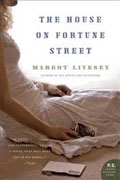The House on Fortune Street
Margot Livesey
book reviews:
· general fiction
· chick lit/romance
· sci-fi/fantasy
· graphic novels
· nonfiction
· audio books
· author interviews
· children's books @
curledupkids.com
· DVD reviews @
curledupdvd.com
newsletter
win books
buy online
links
home
for authors
& publishers
for reviewers

 |
The House on Fortune Street Margot Livesey Harper Perennial Paperback 336 pages May 2009 |
|
Through intricately connected parts, the author delicately dissects the arc of a lifelong friendship and the tortured inner lives of four people connected by family and intimate relationships. The House on Fortune Street
Dara remains somewhat irrational over her reasons for feeling so insecure. Adding to her turmoil is the strange, somewhat fractured relationship that she has had with Cameron, her distant, unassuming father who mysteriously deserted Dara and her younger brother when Dara was only ten. Dara’s skills as a counselor for abused women haven’t made her own life any easier. As she tries hard to mask her longing for Edward, living like a soothsayer, poring over signs and omens, convinced that he will make good on his promises, she tries to build an independent life for herself in the downstairs flat in the house on Fortune Street owned by her best friend, Abigail. In contrast, the fiery and independent Abigail has spent much of her own life pursuing her physical and emotional needs, never quite understanding why her best friend could be so needy for a man to make her happy. With her complicated mixture of stinginess and generosity, Abigail has her own ghosts and is haunted by the neglect of her parents - her athletic, mercurial father, and her charming, sylph-like mother. Life for Abigail has been a struggle for survival, especially when she had to move out of home and support herself financially when she was only fifteen. Whereas Dara is shaped by the belief that childhood influences shape your psyche and your adult life, Abigail has been molded by her ambition and belief that, if you work hard, you can control almost everything, including your feelings. Two other characters play an integral part in this story, orbiting the lives of Abigail and Dara. There’s Abigail’s boyfriend, Sean, who has a passion for Keats, and Dara’s father, Cameron, who has struggled to shield his inappropriate desires throughout much of his life. Lately Sean has been baffled by the demise of his marriage, and he worries about Abigail’s sudden “busyness” - and that the natural channels of communication between him and Abigail, those “glittering lively streams that had begun to flow at their first meeting,” are now clogged with doubt and disagreement and have been forced underground. One part of Sean has blossomed in the warmth of Abigail’s attention; the other, however, is convinced that she’s trying to pull the wool over his eyes by having a torrid affair. Cameron, in contrast, has always felt responsible for his brother Lionel’s death. It is only through seeing a copy of Alice in Wonderland with an essay about Charles Dodgson that he begins to glimpse some dark, aberrant corner of himself: “for the first time I knew there was someone else like me, someone else whose desires didn’t fit into any appropriate category.” There are some painful revelations here, but also some delicately nuanced observations on the nature of the human condition as both Dara and Abigail - and Sean and Cameron - are forced to reconcile with their own version of Eden. It is Livesey’s intricate structure that propels this narrative forward to its devastating conclusion as Dara oscillates between “idyllic daydreams and precautionary disasters,” and a metaphorical headache that is suddenly so piercingly literal. It is not surprising, then, that she ends up feeling taken for granted, miserable and betrayed on both the work and home fronts. Most heartbreaking is Abigail, who in the face of Dara's devastating tragedy stares at the muddy waters of the Thames and blames herself for the fact that she always kept her best friend at such a distance. Originally published on Curled Up With A Good Book at www.curledup.com. © Michael Leonard, 2008 |
| Also by Margot Livesey: |
|
|
|
 Click here to learn more about this month's sponsor! |
|
| fiction · sf/f · comic books · nonfiction · audio newsletter · free book contest · buy books online review index · links · · authors & publishers reviewers |
|
| site by ELBO Computing Resources, Inc. | |
 Thirty-something Dara is a brittle yet compassionate social worker who mentors at a woman’s center in central London.
She has spent much of her adult life frantically searching for true love and happiness, yet her hopes for an easy and uncomplicated intimacy always seem out of reach. She currently aches to have a life with Edward, her boyfriend, an accomplished violinist, but Edward lives with his former girlfriend and their 2-year-old daughter and refuses to commit to Dara.
Thirty-something Dara is a brittle yet compassionate social worker who mentors at a woman’s center in central London.
She has spent much of her adult life frantically searching for true love and happiness, yet her hopes for an easy and uncomplicated intimacy always seem out of reach. She currently aches to have a life with Edward, her boyfriend, an accomplished violinist, but Edward lives with his former girlfriend and their 2-year-old daughter and refuses to commit to Dara.